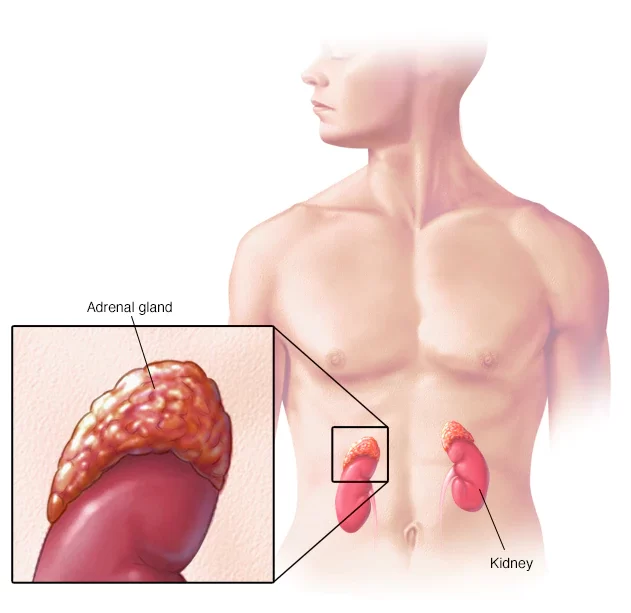Adrenal

Surgeries
- Open/Laparoscopic/ Robotic Adrenalectomy
- Open/Laparoscopic/ Robotic Adrenal sparing removal of tumour
Adrenal Cancer
Adrenal cancer, a rare malignancy arising from the adrenal glands, impacts the small, triangular organs situated atop each kidney. These crucial glands play a pivotal role in producing hormones that regulate various bodily functions, including metabolism, blood pressure, and stress response. Adrenal cancer typically manifests with vague symptoms such as abdominal pain, weight loss, and hormonal imbalances.
The diagnosis of adrenal cancer involves a comprehensive examination, imaging studies, and often a biopsy. Treatment strategies depend on the cancer’s stage and may include surgery, chemotherapy, or targeted therapies. Due to its rarity, adrenal cancer poses challenges in early detection and treatment. A multidisciplinary approach involving oncologists, surgeons, and endocrinologists is essential for devising effective management plans and improving outcomes for individuals facing this uncommon but impactful form of cancer.

Symptoms
- Weight gain
- Muscle weakness
- Pink or purple stretch marks on the skin
- Hormone changes in women that might cause excess facial hair, hair loss on the head and irregular periods
- Hormone changes in men that might cause enlarged breast tissue and shrinking testicles
- Nausea
- Vomiting
- Abdominal bloating
- Back pain
- Fever
- Loss of appetite
- Loss of weight without trying
Cancer Causes
It’s not clear what causes adrenal cancer.
Adrenal cancer forms when something creates changes (mutations) in the DNA of an adrenal gland cell. A cell’s DNA contains the instructions that tell a cell what to do. The mutations can tell the cell to multiply uncontrollably and to continue living when healthy cells would die. When this happens, the abnormal cells accumulate and form a tumor. The tumor cells can break away and spread (metastasize) to other parts of the body.
Genetic Predisposition: In some cases, individuals with certain genetic syndromes, such as Li-Fraumeni syndrome or Beckwith-Wiedemann syndrome, have an increased risk of developing adrenal cancer. Genetic mutations inherited from parents may play a role in the initiation of cancerous growth.
TP53 Gene Mutations: Alterations in the TP53 gene, responsible for suppressing tumor formation, have been identified in a subset of adrenal cancer cases. Mutations in this gene can lead to uncontrolled cell growth and the development of cancer.
Hereditary Factors: A family history of adrenal cancer or other related cancers may elevate an individual’s susceptibility. While rare, there is evidence suggesting a hereditary component in some cases.
Exposure to Carcinogens: Prolonged exposure to certain environmental toxins or carcinogens may contribute to the development of adrenal cancer, although specific agents linked to this cancer are not well-defined.
Age and Gender: Adrenal cancer tends to occur more frequently in children than adults, and there is a slight predilection for females. However, it can affect individuals of any age or gender.
Hormonal Imbalances: Some cases of adrenal cancer are associated with abnormal hormone production, particularly excess cortisol (Cushing’s syndrome) or androgens. Hormonal imbalances can contribute to tumor growth and progression.
Risk Factors
Adrenal cancer happens more often in people with inherited syndromes that increase the risk of certain cancers. These inherited syndromes include:
- Beckwith-Wiedemann syndrome
- Carney complex
- Li-Fraumeni syndrome
- Lynch syndrome
- Multiple endocrine neoplasia, type 1 (MEN 1)
Prevention of Adrenal Cancer
While it’s challenging to prevent adrenal cancer entirely due to its complex and often unknown causes, certain lifestyle choices and awareness can potentially reduce the risk or contribute to early detection. Here are some general guidelines for adrenal cancer prevention:
Regular Medical Check-ups: Routine health check-ups and screenings are crucial for early detection. Individuals with a family history of adrenal cancer or certain genetic syndromes may benefit from more frequent monitoring.
Genetic Counseling: If there is a family history of adrenal cancer or related syndromes, considering genetic counseling can help assess the risk and provide guidance on potential preventive measures.
Maintain a Healthy Lifestyle: Adopting a healthy lifestyle, including a balanced diet, regular exercise, and maintaining a healthy weight, can contribute to overall well-being. While these measures may not directly prevent adrenal cancer, they support overall health and reduce the risk of various diseases.
Limit Exposure to Carcinogens: Minimize exposure to environmental toxins and carcinogens whenever possible. This includes being mindful of workplace exposures and following safety guidelines.
Hormone Therapy Awareness: Individuals receiving long-term hormone therapy should be aware of potential risks and undergo regular monitoring. Hormonal imbalances, if detected early, may be managed more effectively.
Seek Prompt Medical Attention: If experiencing symptoms such as persistent abdominal pain, unexplained weight loss, or hormonal irregularities, seek medical attention promptly. Early diagnosis and intervention can improve outcomes.
Participate in Clinical Trials: For individuals at higher risk due to genetic factors, participation in clinical trials focused on early detection and prevention may offer valuable insights and potential preventive strategies.
It’s important to note that adrenal cancer is rare, and many cases occur sporadically without clear risk factors. As research continues to uncover more about the causes of adrenal cancer, staying informed and maintaining a proactive approach to health can contribute to overall well-being and potentially aid in early detection. Regular communication with healthcare professionals is key to addressing individual risk factors and developing personalized preventive strategies.

